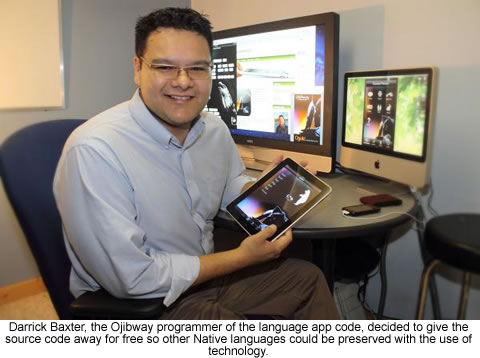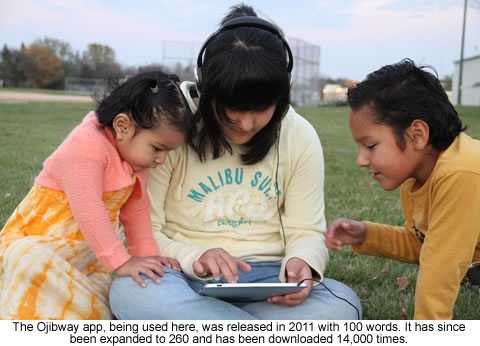 |
Canku Ota
|
 |
|
(Many Paths)
|
||
|
An Online Newsletter
Celebrating Native America
|
||
|
May 2013 - Volume 11
Number 5
|
||
|
|
||
|
Learning a Native
Language? Ojibway Programmer Has an App For That
|
||
|
by Marc Dadigan - Indian
Country Today Media Network
|
||
|
credits: photos courtesy
of Ogoki Learning Systems Inc.
|
|
The app was a program to help people learn Ojibway, the ancestral language of Baxter's Anishnaabe people, and he saw almost immediate results. "I didn't tell her anything about it, but within a week, I heard her talking to her grandma and she was using Ojibway words," said Baxter, 36. "I just realized then this is such a great way to learn a language. Today kids are more likely to carry a smartphone or a tablet than a book." In October 2011, Baxter founded Ogoki Learning Systems Inc., a software design company that specializes in creating smartphone and tablet apps and publishing e-books that help teach Native languages, and he says there is a huge, largely untapped market for Native language learning. "The Ojibway language is one of the better off languages, and our language territory spans from the state of New York to Saskatchewan to Montana and Ontario. It's a large speaking group," said Baxter, whose company is based in Sandy Bay Ojibway First Nation in Manitoba. Since the Ojibway Language and People app was released in 2011, there have been about 14,000 downloads, and Baxter said he often hears from colleagues and schoolteachers who are using the app to foster a love of language learning. The original app, which can be downloaded from iTunes for free, contained 100 Ojibway words, but has since been expanded to 260. The demand has grown beyond Ojibway territory as Baxter has worked with the Blackfeet Tribe and other First Nations to design apps for their languages. Even at conferences, Baxter is flooded with requests from language learners and tribal officials to create apps for their language. This led to Baxter making the unorthodox decision to give away his company's invention, the source code for the Ojibway language app, for free. The code is now available on his company's website, and anyone can download it and work to adapt it for their own native language learning. "People's eyes would light up when I would tell them I could send them the source code, and I wanted to create a legacy and help people save their languages," Baxter said. He also said he wanted to honor the memory of the Ojibway elder, Eddie Munroe of Garden Hill First Nation in Northern Manitoba, who lent his voice for the original Ojibway app but passed away at the age of 58 only a week after making the recordings. "He was very close and important to me," Baxter said. "After he passed, I couldn't listen to his voice at first, so there was 8 or 10 months of lag time before I finally released the app on iTunes." Baxter said his small company, which currently has two-contract employees, will still be able to make money by publishing e-books, creating new apps or by consulting with organizations and schools that download the app but need more assistance to tailor the code to their needs. They also bring in revenue by producing native language CDs and DVDs, he said. There doesn't seem to be a limit to the creative ways the language apps can be used, Baxter said. For instance, he recently received an e-mail from a nurse who asked him to include medical terms and phrases, like "Can you describe your pain on a scale from 1-10," so medical first-responders could better communicate with elders in isolated communities in Northwestern Ontario.
In a way, it's fitting that Baxter's app is helping to save lives as his company is named after the Ogoki River, which flows through his people's traditional river and, as he says, "has been feeding and sustaining our people for countless generations." "I've gotten calls from all over the globe, from the Maori in New Zealand to the Sami people in Norway, who I had to Google. I didn't know about them," he said. "It was kind of an awakening of just how global this desire to speak and preserve our languages are." |
|
|
||
|
|
||
| Canku Ota is a free Newsletter celebrating Native America, its traditions and accomplishments . We do not provide subscriber or visitor names to anyone. Some articles presented in Canku Ota may contain copyright material. We have received appropriate permissions for republishing any articles. Material appearing here is distributed without profit or monetary gain to those who have expressed an interest. This is in accordance with Title 17 U.S.C. Section 107. | ||
|
Canku Ota is a copyright ©
2000 - 2013 of Vicki Williams Barry and Paul Barry.
|
||
 |
 |
|
|
The "Canku
Ota - A Newsletter Celebrating Native America" web site and
its design is the
|
||
|
Copyright ©
1999 - 2013 of Paul C. Barry.
|
||
|
All Rights Reserved.
|
||
 After
observing how his 12-year-old daughter fiddled obsessively with
the family's iPad, computer programmer Darrick Baxter designed an
app just for her, downloaded it secretly onto the device and waited
to see what would happen.
After
observing how his 12-year-old daughter fiddled obsessively with
the family's iPad, computer programmer Darrick Baxter designed an
app just for her, downloaded it secretly onto the device and waited
to see what would happen. He's
currently looking for a medical organization to partner with to
honor the nurse's request. He is also planning a workshop with at-risk
youth in Winnipeg where he'll teach them to make apps and discuss
with them how they can start their own business.
He's
currently looking for a medical organization to partner with to
honor the nurse's request. He is also planning a workshop with at-risk
youth in Winnipeg where he'll teach them to make apps and discuss
with them how they can start their own business.